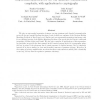Free Online Productivity Tools
i2Speak
i2Symbol
i2OCR
iTex2Img
iWeb2Print
iWeb2Shot
i2Type
iPdf2Split
iPdf2Merge
i2Bopomofo
i2Arabic
i2Style
i2Image
i2PDF
iLatex2Rtf
Sci2ools
119
click to vote
STOC
2007
ACM
2007
ACM
Exponential separations for one-way quantum communication complexity, with applications to cryptography
We give an exponential separation between one-way quantum and classical communication protocols for two partial Boolean functions, both of which are variants of the Boolean Hidden Matching Problem of Bar-Yossef et al. Earlier such an exponential separation was known only for a relational version of the Hidden Matching Problem. Our proofs use the Fourier coefficients inequality of Kahn, Kalai, and Linial. We also give a number of applications of this separation. In particular, we provide the first example in the bounded storage model of cryptography where the key is secure if the adversary has a certain amount of classical storage, but is completely insecure if he has a similar (or even much smaller) amount of quantum storage. Moreover, in the setting of privacy amplification, we show that there exist extractors which yield a classically secure key, but are insecure against a quantum adversary. Supported in part by Canada's NSERC. Supported in part by ACI S?ecurit?e Informatique...
Algorithms | Hidden Matching Problem | Integrated Project Qubit | Project Qubit Applications | STOC 2007 |
| Added | 03 Dec 2009 |
| Updated | 03 Dec 2009 |
| Type | Conference |
| Year | 2007 |
| Where | STOC |
| Authors | Dmitry Gavinsky, Julia Kempe, Iordanis Kerenidis, Ran Raz, Ronald de Wolf |
Comments (0)

